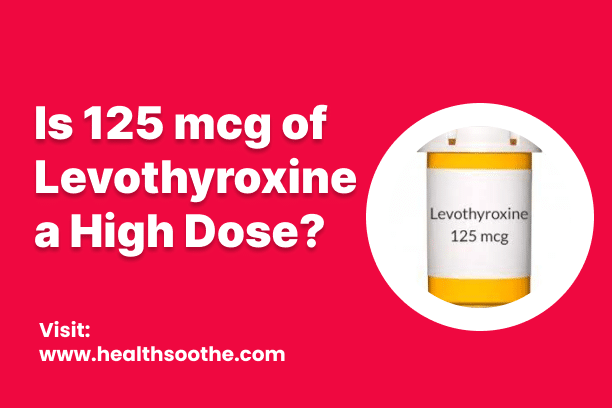Levothyroxine is a commonly prescribed medication for addressing thyroid disorders, particularly hypothyroidism. Its mechanism involves substituting or supplementing the thyroid gland-produced hormone, crucial for regulating various bodily functions. Establishing the correct levothyroxine dosage can be intricate, prompting inquiries about whether 125 mcg is deemed a high dosage.
In summary:
A 125 mcg dose of levothyroxine may be appropriate or high, depending on the patient’s weight, age, and thyroid function. The average full replacement dose is around 1.6 mcg/kg/day (ATA Guidelines, 2014). For a 70 kg adult, this equals approximately 112 mcg daily. Thus, 125 mcg is within range but may be considered high for elderly patients or those with cardiac risk. Overdosing may lead to symptoms like palpitations or anxiety. Regular TSH monitoring is essential to adjust therapy. Sources: American Thyroid Association Guidelines (2014), Levothyroxine Monograph – Lexicomp, and JAMA, 2017;317(2):197–198. Always consult a physician before dose changes.
Understanding Levothyroxine: What is it and How Does it Work?
Levothyroxine is a synthetic variant of the thyroid hormone thyroxine, commonly referred to as T4, naturally produced by the thyroid gland. This hormone holds pivotal significance in governing the body’s metabolism, exerting influence over various bodily systems such as the heart, brain, muscles, and digestive system. In cases of an underactive thyroid or thyroid gland removal, levothyroxine operates by substituting or supplementing the deficient T4 hormone to maintain essential physiological functions.
The Role of Levothyroxine in the Body
Levothyroxine plays a crucial role in preserving overall health and well-being by regulating the body’s metabolism, influencing factors such as energy levels, body temperature, weight, and mood. Through the restoration of the T4 hormone, levothyroxine facilitates proper and efficient bodily functions.
A significant function of levothyroxine is its contribution to maintaining a healthy weight. In cases of insufficient thyroid hormone production, the body’s metabolism slows, resulting in weight gain. Levothyroxine supplementation for individuals with hypothyroidism helps normalize hormone levels, aiding in weight management and preventing further weight gain.
Beyond its impact on weight, levothyroxine is instrumental in promoting cardiovascular health. Thyroid hormones, including T4, directly influence the heart and blood vessels, regulating heart rate, blood pressure, and cholesterol levels. By ensuring adequate T4 levels, levothyroxine contributes to the maintenance of a healthy cardiovascular system, reducing the risk of heart disease.
How Levothyroxine is Used in Treating Thyroid Disorders
Levothyroxine is primarily employed in the treatment of hypothyroidism, a condition characterized by insufficient production of thyroid hormones by the thyroid gland. Additionally, it finds utility in managing certain types of goiters and thyroid cancer. By administering levothyroxine, individuals experiencing hypothyroidism can normalize their hormone levels, thereby mitigating symptoms like fatigue, weight gain, and depression.
Moreover, levothyroxine is commonly prescribed as a long-term therapeutic measure for individuals who have undergone thyroid gland removal due to thyroid cancer or other thyroid disorders. In such cases, the body is unable to produce adequate thyroid hormones independently, and levothyroxine supplementation becomes essential to maintain proper bodily functions.
It’s crucial to emphasize the necessity of consistent and regular intake of levothyroxine. Dosage adjustments may be required over time to achieve optimal hormone levels in the body. Regular blood tests are typically conducted to monitor hormone levels and ensure the appropriateness of the dosage.
Pros and Cons of levothyroxine
Pros of Levothyroxine
- Effective Treatment for Hypothyroidism
- Symptom Alleviation
- Standardized Dosage
- Long-Term Stability
Cons of Levothyroxine
- Individual Variability
- Potential Side Effects
- Interaction with Other Medications
- Timing and Food Interference
Differences Between levothyroxine and gatorade
Levothyroxine
Levothyroxine is used to replace or supplement the insufficient thyroid hormone produced by the thyroid gland. It helps regulate metabolism and alleviate symptoms associated with an underactive thyroid.
Gatorade
Gatorade is not intended for medical treatment. Instead, it is formulated to replenish electrolytes (such as sodium, potassium, and chloride) and provide carbohydrates to help athletes and individuals stay hydrated during exercise.
Alternative to levothyroxine
Eltroxin (Eltrombopag)
Eltrombopag is used for the treatment of thrombocytopenia but has also been investigated for its potential thyroid-stimulating effects. It is not a direct replacement for levothyroxine but is sometimes explored in specific situations.
Determining Dosage: Factors to Consider
When determining the suitable dosage of levothyroxine, several factors must be considered, encompassing age and weight considerations, the gravity of the thyroid disorder, and individual metabolic rate and absorption. A comprehensive understanding of these factors is essential in prescribing an accurate dosage tailored to each patient’s needs.
Read Also: Telemedicine in Pediatrics: Possibilities and Pitfalls.
Age and Weight Considerations
Age and weight significantly influence levothyroxine dosage requirements. Elderly individuals and children may necessitate different dosages compared to adults. Variations in metabolism and absorption across different age groups are noteworthy. For instance, in the elderly, a slower metabolism may mandate a lower dosage to avoid potential side effects. Similarly, children’s developing bodies and distinct metabolic rates may warrant adjustments in dosage. Additionally, weight plays a role in dosage determination, with higher body weight potentially requiring a higher dosage to achieve the intended therapeutic effect.
Severity of Thyroid Disorder
The severity of the thyroid disorder is a key determinant of levothyroxine dosage. Individuals with more pronounced hypothyroidism may require higher doses to effectively regulate their hormone levels. Dosage adjustments often rely on thyroid function test results, measuring thyroid-stimulating hormone (TSH) and free thyroxine (T4) levels in the blood. These tests aid in determining the dosage needed to restore hormone balance and alleviate symptoms.
Individual Metabolic Rate and Absorption
Variability in metabolic rate and levothyroxine absorption exists among individuals. Some may require higher dosages for the desired therapeutic effect, while others may need lower dosages. Genetic factors, liver function, and concurrent medications can influence how the body metabolizes and absorbs levothyroxine. Regular monitoring and adjustments are crucial for optimal treatment outcomes. This involves periodic blood tests to measure TSH and T4 levels, assessing the current dosage’s effectiveness. Based on results, dosage may be adjusted to maintain hormone balance.
Is 125 mcg a High Dose?
Addressing whether 125 mcg of levothyroxine is considered a high dose requires contextual consideration and an individualized approach. To gain a clearer perspective, let’s compare this dosage with others and explore potential side effects.
Dosages of levothyroxine can vary widely among individuals based on factors such as age, weight, the severity of the thyroid disorder, and metabolic rate. What might be a suitable and effective dose for one person may not be the same for another.
In the context of levothyroxine dosages, 125 mcg can be categorized as a moderate dose. However, it’s important to note that what constitutes a high or low dose is relative and can vary from person to person. Some individuals may require higher doses to achieve the desired therapeutic effect, while others may respond well to lower doses.
Potential side effects associated with levothyroxine are often related to dosage levels. Higher doses may increase the risk of adverse effects, such as palpitations, insomnia, and anxiety. Conversely, insufficient dosage may result in persistent symptoms of hypothyroidism.
Ultimately, the determination of whether 125 mcg is a high dose should be made in consultation with a healthcare professional who considers the individual’s specific health status, thyroid function test results, and any observed symptoms. Regular monitoring and adjustments, if necessary, are crucial to maintaining an optimal dosage that effectively addresses the thyroid disorder while minimizing potential side effects.
Conclusion
In conclusion, the appropriateness of a 125 mcg dosage of levothyroxine as high or otherwise hinges on various factors, making it a nuanced consideration. The individualized nature of thyroid treatment, influenced by age, weight, severity of the thyroid disorder, and metabolic rate, underscores the importance of personalized healthcare.
Levothyroxine, a vital medication for managing thyroid disorders, plays a pivotal role in restoring hormone balance and alleviating symptoms. The dosage, including 125 mcg, is part of a spectrum that can range from low to high, depending on the unique needs of each patient.
Understanding that dosages are not universally standardized, healthcare professionals tailor treatment plans based on comprehensive assessments, including thyroid function tests and monitoring for potential side effects. Regular communication with a healthcare provider is crucial to ensuring an optimal balance, where the benefits of the medication outweigh any associated risks.
In navigating the complexities of levothyroxine dosages, collaboration between patients and healthcare professionals is key. This ongoing partnership allows for adjustments, if needed, and ensures that individuals receive the most effective and well-tolerated treatment for their specific thyroid conditions.




